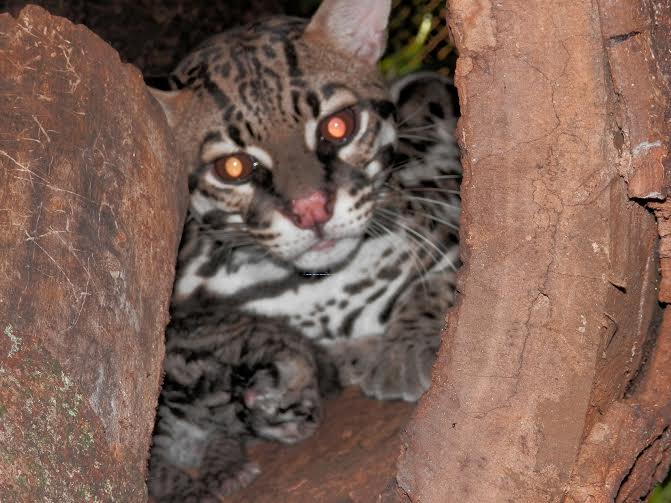Chila just became a mother for the first time – but she’s not ready to step out with her baby yet. She finds it is better to stay home and keep an eye on him.
Or her.
Chila is an ocelot, a manigordo in Spanish, and her baby is the newest star at Zoo Ave, an animal rescue center in La Garita, west of San José.
Chila’s baby is the first ocelot born in captivity here and reason for boasting. Ocelots are on the endangered species list; these small spotted cats are losing ground as their territory is given over to encroaching urban life. At Zoo Ave they live in a hollowed-out tree trunk nestled in treetops, hidden from zoo visitors. Even papa was banned from the nursery.
Baby was born July 23 around 5 in the morning, or at least that’s when it was discovered. Although mom and dad have been together for three years it was just about four months ago that Chila began acting coy and cuddly, as if she was in heat. Her partner, Tacares, took the hint.
Both Chila and Tacares will stay at Zoo Ave for life.
“They became accustomed to being with humans,” said Ronald Sibaja, who works with mammals at the center. “They are tame and can’t live in the wild. They would go to humans thinking they are friends.”
Both Chila and her mate, Tacares, were once kept as pets in homes: Chila in Los Chiles along the northern border, and Tacares in the town of Tacares near Grecia. As they grew older and it became obvious they are wildcats, the families that housed them contacted Zoo Ave.
Ocelots are small, 7-14.5 kilos (15-30 pounds), not much bigger than the furry pets you have at home. They live mostly in forest areas and are loners and territorial, claiming 15- to 30-kilometer territories for hunting. Small animals including birds make up their diet.
Baby, who doesn’t have a name at the time of this writing, will be raised in as natural a setting as possible, with no human coddling, so that someday he or she can make it in the wild. Zoo Ave has two huge tracts of land along the Pacific coast that serve as “schools” where animals can readjust to natural wildlife conditions. There, they are monitored and tracked; when they are ready, they go out on their own. But until baby reaches maturity, at about a year, he or she will share space with mama in the tree-trunk house in a jungle-like enclosure.
Zoo Ave is a rescue center for birds, reptiles and mammals, located in La Garita de Alajuela, west of San Jose. Visit www.zooavecostarica.org or call 2433-8989 for hours and prices.






